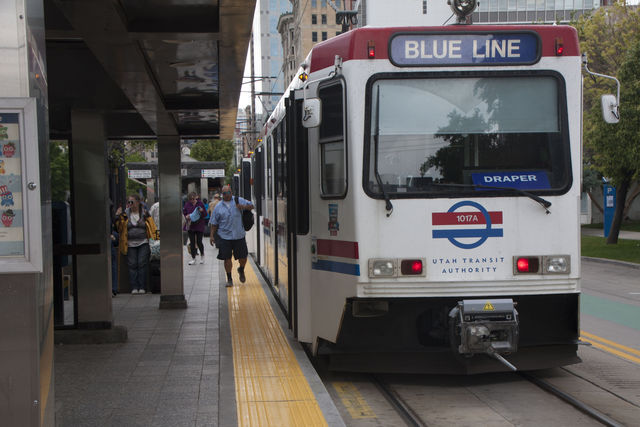A couple months ago my friend and I found ourselves ready to leave a party in Salt Lake City at midnight. Knowing all public transport in the city was stopped for the night, and not wanting to pay for a cab, my friend decided he was sober enough to drive us home. The next morning I found out that my friend was so intoxicated, he didn’t even remember driving. Thankful for our lives, we vowed never to drive drunk again, but our experience made us question why public transit in Salt Lake doesn’t offer late night transportation.
With all the growth it has seen in the past couple decades, Salt Lake’s relatively new public transportation system, Utah Transit Authority (UTA), is still behind the curve. Currently, Salt Lake’s buses begin to halt operation by 9 p.m., while their TRAX system ends its nighttime operation, along with the rest of the bus lines, by 11 p.m. This abrupt stop in public transportation service leaves many citizens having to go out on a limb to find a way around the city at night. A later-running UTA system in Salt Lake City would be a boon to its economy and residents.
Public transportation systems allow masses of individuals to travel great distances around a city without the congestion and environmental and financial consequences of cars. This is a big help to the city’s economy, which allows workers to get to and from their jobs in an efficient manner. Unfortunately, late-night workers in Salt Lake are on their own to get back home after 11 p.m. This is difficult for night-shift restaurant, movie theatre and nightclub employees, who are working after the buses and trains stop running. As a college student who can’t afford a car, this is the only time I can work while attending my classes during the day. However, the hours I can work are limited by virtue of this inconvenient schedule. A later-running public transit would create more jobs for bus and train drivers, and keep more money in individuals’ pockets while reducing fossil fuel emissions.
Salt Lake City is known for having its bouts of poor air quality in the winter. This is caused by an atmospheric phenomenon known as an inversion: cooler, denser air is trapped beneath warmer, lighter air in a valley. These conditions can remain for multiple days, creating a pocket of stagnant air covering the city and trapping all of its pollution — especially exhaust emissions. Two years ago, when I was flying into Salt Lake, the plane had to land further south in Provo because the inversion formed a brown layer of the city’s exhaust thick enough to blind the pilot’s view. Unfortunately, with today’s technology, there is little we can do to fix an inversion, but we can mitigate the pollution that is released into the air. Extending the city’s public transportation service would be one way to improve air quality, while also keeping more cars off the road and reducing the amount of fossil fuels we burn.
Besides keeping the city’s air cleaner, later-running public transportation would also keep the city safer. Contrary to popular belief, Mormons currently represent a minority of Salt Lake City’s population. This leaves upwards of 100,000 people who are allowed to imbibe. Most would be calling it an early night to leave a party before 11 p.m. to catch the last train or bus. Therefore, many intoxicated individuals rely on shelling out the cash for taxis or walking extreme distances. Some even decide to drive drunk. As a U student, I have witnessed people driving home drunk too many times. People don’t want to spend the extra money on cabs, so they too often find themselves wanting to walk or drive home drunk. Drunk driving has its inherent hazards, and even walking home late at night can be dangerous, especially for those who are alone or need to travel through a rough neighborhood.
A later-running UTA system would provide a major service to the city, creating jobs, saving money and saving lives. A short addition, three hours of extended night service would allow people to continue traveling around the city in a safe and inexpensive manner till 2 a.m. I believe these three hours of operation are essential for serving a large group of people. I propose that the city should experiment with a later schedule, beginning with the weekends, as soon as possible. That way, my friend and I wouldn’t have risked our lives and others’ by driving home drunk that night.Now’s the time to keep our air cleaner; now’s the time to improve the economy; now’s the time to keep our streets safer; now’s the time to expand the UTA service later into the night.



evangelinaln16 • Jun 7, 2018 at 8:00 pm
My unheard of trap contract:
http://roger.blogs.telrock.org
travisga60 • May 3, 2018 at 8:37 am
Updated contrive call:
http://dolores.web.telrock.net
rachelleca11 • Apr 22, 2018 at 7:49 pm
Proposal servant moved:
http://marylou.blogs.telrock.org